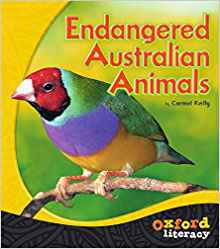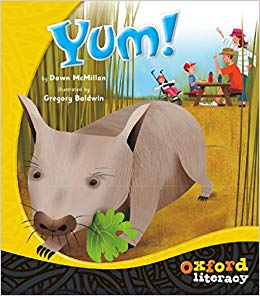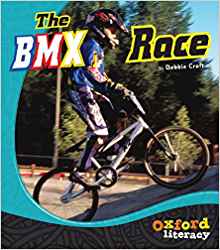-
Endangered Australian Animals
Carmel Reilly
Paperback (OUP Australia and New Zealand, Oct. 1, 2008)Oxford Literacy has been specifically designed to support guided reading in the first three years of school. The Oxford Literacy fiction and non-fiction guided reading texts recognise that a guided reading group in a 'real' classroom never has every student on the same level; therefore, the texts and supporting teaching versions allow educators to work with small groups of students across a range of levels within their stage of reading. Because Oxford Literacy is a guided reading programme, a single title has limited use in a classroom; therefore, it is recommended that educators use multiple copies of a title in guided reading groups to achieve maximum benefit from Oxford Literacy.
-
Oxford Literacy Web Spiders
Gill Munton
Paperback (Oxford University Press, March 14, 2002)Web Spiders is a structured scheme for Key Stage 2 readers who are struggling to read but are still in mainstream classrooms.* High interest, low reading level* Fiction and non-fiction with boy appeal* Short, achievable reads to give a sense of achievement* Look like the books their peers are reading* NLS range of text types to ensure struggling readers get the same experiences as their peers
-
Yum!
Dawn McMillan
Paperback (OUP Australia and New Zealand, )None
-
Oxford Literacy Web
Mal Peet
Paperback (Oxford University Press, Feb. 4, 1999)The Oxford Literacy Web is an exciting new literacy programme designed to guide schools successfully through the primary years. Fitting the requirements of the National Literacy Strategy, National Curriculum in England and Wales, English Language 5-14 in Scotland, and Common Curriculum inNorthern Ireland, the Oxford Literacy Web guides pupils through the core skills associated with learning to read and write with a diverse range of literary styles within the genres of fiction, non-fiction, rhymes, language, and poetry.The "Non-Fiction" strand is a series of colourful, lively information books. They can be used to teach valuable information retrieval and research skills, and they enable children to learn to read and write a range of different text types. The books can be used with children at different levels ofreading ability for shared reading with the teacher, guided reading, or independent reading. The Year 1 Non-Fiction books are designed to be used with children of 4-6 years. They present a range of text types on two popular infant topics (toys and animals). The books are available in both standardand `big book' format.Keep Your Hamster Happy gives instructions on looking after a pet hamster.
-
Oxford Literacy Web Spiders
Keith Gaines
Paperback (Oxford University Press, March 14, 2002)Web Spiders is a structured scheme for Key Stage 2 readers who are struggling to read but are still in mainstream classrooms.* High interest, low reading level* Fiction and non-fiction with boy appeal* Short, achievable reads to give a sense of achievement* Look like the books their peers are reading* NLS range of text types to ensure struggling readres get the same experiences as their peers
-
Oxford Literacy Web Spiders: Year 6
Frances Usher, Keith Gaines, David Clayton, Anthony Masters, etc.
Paperback (Oxford University Press, )None
-
Australian Sea Lions
Carmel Reilly
Paperback (OUP Australia and New Zealand, )None
-
Oxford Literacy Web: Non-fiction Big Book
Mike Roberts
Hardcover (Oxford University Press, )None
-
Oxford Literacy Web: Pack: "First Leaf Festival", "Moneypenny and the Pond", "Pirate Gold", "The Wise Girl"
Anne Adeney, Frances Usher, Elisabeth Beresford, Joan Aiken, Keith Gaines
Paperback (Oxford University Press, )None V
V
-
The BMX Race
Debbie Croft
Paperback (OUP Australia and New Zealand, Oct. 1, 2008)Oxford Literacy has been specifically designed to support guided reading in the first three years of school. The Oxford Literacy fiction and non-fiction guided reading texts recognise that a guided reading group in a 'real' classroom never has every student on the same level; therefore, the texts and supporting teaching versions allow educators to work with small groups of students across a range of levels within their stage of reading. Because Oxford Literacy is a guided reading programme, a single title has limited use in a classroom; therefore, it is recommended that educators use multiple copies of a title in guided reading groups to achieve maximum benefit from Oxford Literacy.
-
Oxford Literacy Web Spiders
Keith Gaines
Paperback (Oxford University Press, Jan. 31, 2002)Web Spiders is a structured scheme for Key Stage 2 readers who are struggling to read but are still in mainstream classrooms. They provide a short, achievable read to giving a sense of achievement.* High interest, low reading level* Fiction and non-fiction with boy appeal* NLS range of text types to ensure stuggling readers get the same experiences as their peers* Look like the books their peers are reading* Excellent team of authors
-
Oxford Literacy Web
Pippa Goodhart, Louise Gardner
Paperback (Oxford University Press, )The Oxford Literacy Web is an exciting new literacy programme designed to guide schools successfully through the primary years. Fitting the requirements of the National Literacy Strategy, National Curriculum in England and Wales, English Language 5-14 in Scotland, and Common Curriculum inNorthern Ireland, the Oxford Literacy Web guides pupils through the core skills associated with learning to read and write with a diverse range of literary styles within the genres of fiction, non-fiction, rhymes, language, and poetry.The "Fiction" strand: there can be no better way to learn to read than through the Duck Green School and Variety story strands. Exciting stories, hilarious events, and dynamic illustrations combine to ensure diversity and enjoyment. Variety stories extend children's experience of different stylesof fiction. They reinforce vocabulary but include a more challening element to push upward toward the next level.The Stage 1 Consolidation cluster ("Magical World Stories") consists of 3 amusing stories about children who see the world in a surprising and magical way. Louise Gardner's colourful illustrations will instantly appeal to young readers. These stories consolidate the vocabulary learned in the Stage1 Duck Green Stories. The Stage 1 Extension cluster ("Around the World Stories" by Cynthia Rider) comprises three traditional tales from other cultures, sensitively illustrated by Rhian Nest James. These stories extend vocabulary from Stage 1. The books are available in both standard and `big book'format.